
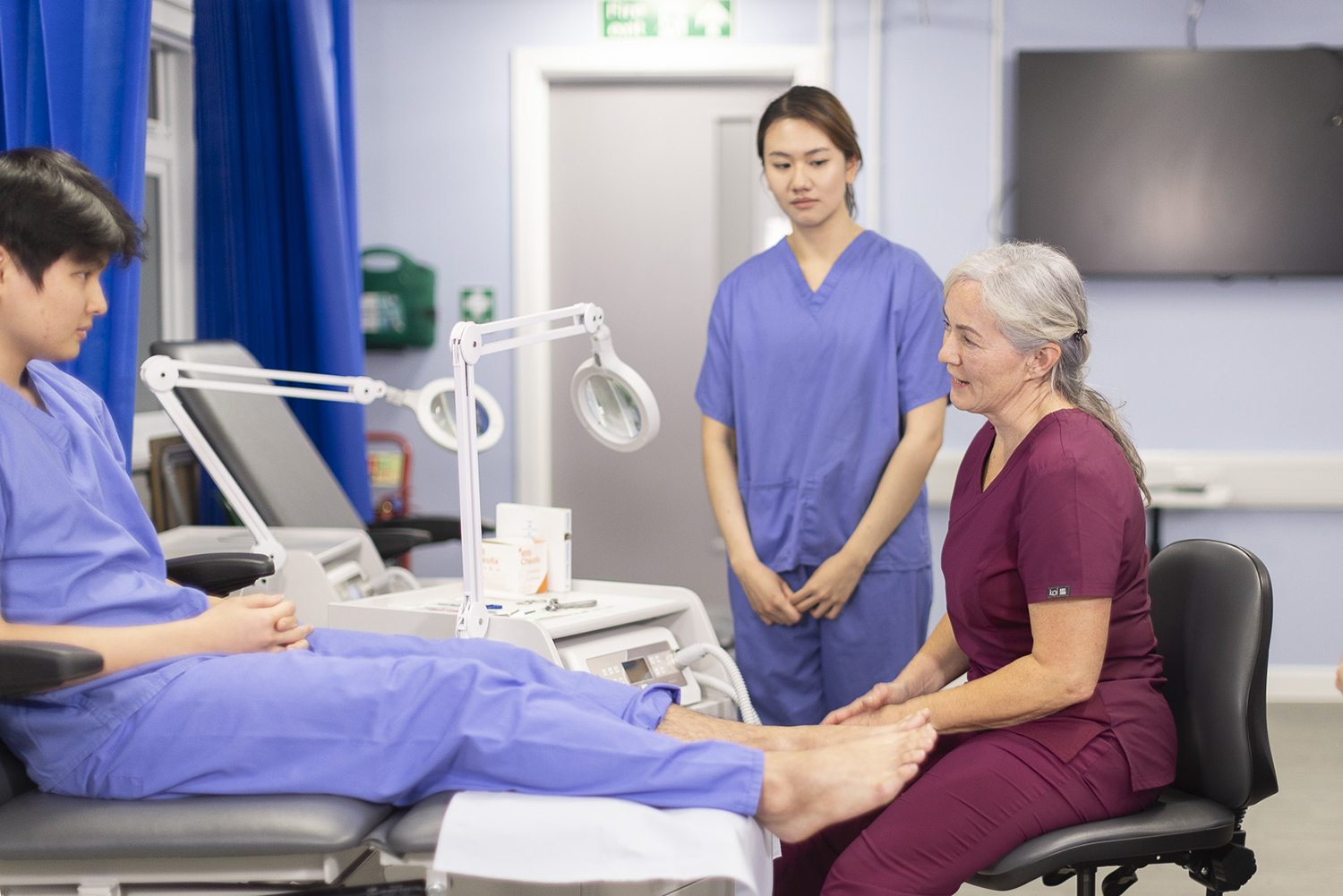
Study Physiotherapy, Occupational Therapy or Podiatry
These allied health professions are dedicated to enhancing the quality of life for individuals through expert care and evidence-based practice. Find out more about these postgraduate courses at Health Sciences University and embark on a rewarding career that makes a difference.
Physiotherapy
What is Physiotherapy?
Physiotherapists help people through movement and exercise, providing manual therapy, education and advice. They help people of all ages and conditions to maintain their health, prevent disease, and manage Long-Term Conditions to improve overall quality of life.
As a science-based profession, Physiotherapy takes a ‘whole person’ approach to health and wellbeing.
This involves encouraging patients to be actively engaged in their own treatment and wellbeing. Physiotherapists educate patients about their bodies and their activity, making them more aware, empowering them, and involving them in their treatment.
Physiotherapy can help to facilitate recovery and / or maintain quality of life so that people can remain independent for as long as possible, enabling them to return to previous activities of daily living, or making adjustments so that they can live as normal a life as possible.
Physiotherapists work in a variety of specialisms in health and social care. There is also the opportunity to be involved in education, research and service management.
You can read more about Physiotherapy on the Chartered Society of Physiotherapy website.

Why become a Physiotherapist?
Physiotherapy offers a varied career path, with opportunities to make a real positive difference to people’s lives.
Physiotherapists undertake many different roles, in a range of sectors and settings including the NHS, private practice and in the community, as well as in higher education and the charity sector. They often work in multidisciplinary and integrated teams, as well as independently.
Physiotherapists can be involved in all stages of patient care; from initial assessment, to diagnosis, treatment, discharge, referral, rehabilitation, and management of long-term conditions.
They work with a variety of age groups and health conditions, and play a key role in promoting and maintaining health.
Health Sciences University is a specialist health sciences University, which means you’ll be surrounded by other students studying a range of health care disciplines. This ranges from Chiropractic to Medical Imaging, Sport and Exercise Science, Speech and Language Therapy, Occupational Therapy, Radiography, Dietetics and Podiatry.
Learning alongside and meeting a variety of health care professionals gives you a fantastic insight into clinical life after graduation.
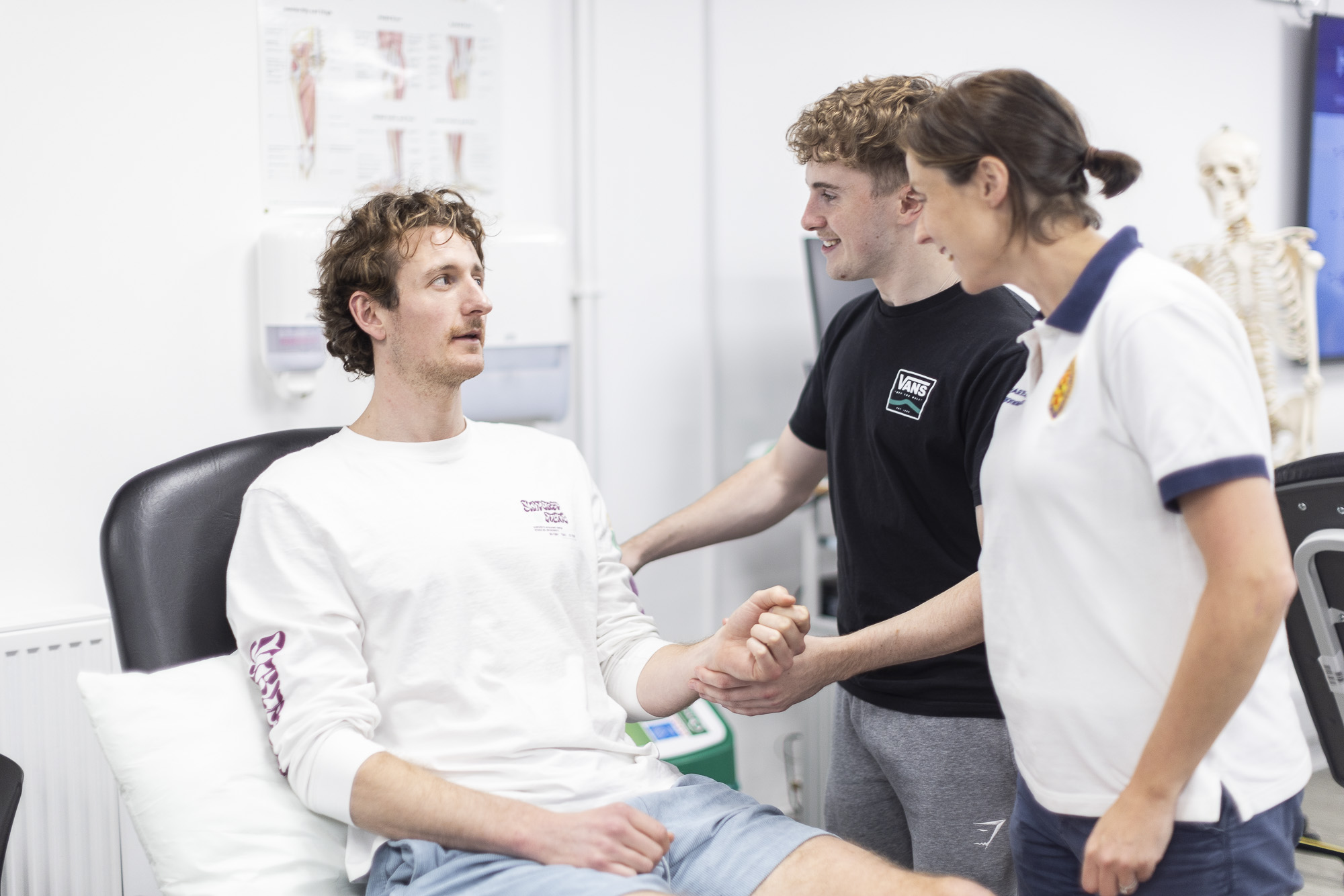
How do I become a Physiotherapist?
You’ll need to study for a degree in Physiotherapy – either at undergraduate or postgraduate level. We offer our MSc Physiotherapy (Pre-Registration) degree here at Health Sciences University.
What qualities does a Physiotherapist need?
First and foremost, Physiotherapists are caring individuals who have good communication skills. You need to have empathy, compassion, be proactive, resilient, work autonomously, and have the ability to and be good at collaborative working collaboratively. You also need to be calm and respond well in a crisis.
Good Physiotherapists work with one another’s strengths to achieve the best outcome possible for the patient. They also need to be adaptable and flexible in their approach to work.
What might I have studied already?
Many of our applicants have studied, Sports Science, Exercise Therapy, Rehabilitation, Occupational Therapy, Chiropractic or Nursing. We generally look for a 2:2 in a relevant Science degree subject, or relevant clinical experience. A good understanding of Anatomy is important for this course.
If you are unsure whether you have the right qualifications for this course, please do contact our friendly Admissions team by emailing admissions@aecc.ac.uk.
MSc Physiotherapy (Pre-Registration)
Additional course information
Course Lead: Louise Stanley 
Course Lead: Louise Stanley
Louise has 17 years’ experience in Physiotherapy in a variety of settings including NHS, research, voluntary and higher education sectors.
Louise specialised initially in respiratory physiotherapy working in a large acute hospital trust and then went on to facilitate and run clinical research trials in Interstitial Lung Diseases, during which time she gained a Masters in Clinical Research. Louise has also undertaken roles within the voluntary sector supporting patients with interstitial lung disease and developing remote support services for an established charity.
Louise has been involved in the delivery of pre registration physiotherapy education since 2010. She has a particular interest in the use of simulation and digital technologies in education and has utilised both virtual and physical simualtions to facilitate education delivery and practice based learning opportunities.
Occupational Therapy
What is Occupational Therapy?
Occupational Therapist are creative problem solvers who enjoy enabling people to get the most out of life. As an Occupational Therapist, you’ll empower people to overcome challenges that they are facing, so that they can live their lives as independently and fully as possible.
Occupational therapists work with people experiencing challenges with everyday life to help them overcome these difficulties. This could involve teaching new ways of doing things, introducing new techniques, or using assistive equipment.
Occupational therapists are also involved in rehabilitation, improving aspects of a person’s physical, mental, or social abilities through occupation-focused intervention. This could include rehabilitation for individuals who have had a stroke, or working with people living with dementia, eating disorders, or children with dyspraxia.
You will be supporting people to make changes to their home or work environments to make tasks easier for them to manage. Occupational therapists can work in traditional health and social care settings, as well as within charities, prisons, the third sector, or private practice, showcasing the versatility of this profession.
Occupational therapy provides the opportunity to work in both mental and physical health settings, as well as to support people with learning difficulties.
Studying at a specialist health sciences university like Health Sciences University, you will gain experience alongside healthcare professionals from a range of specialisms. You will share our campus with chiropractors, physiotherapists, radiographers, sonographers, speech and language therapists, dietitians, and more.
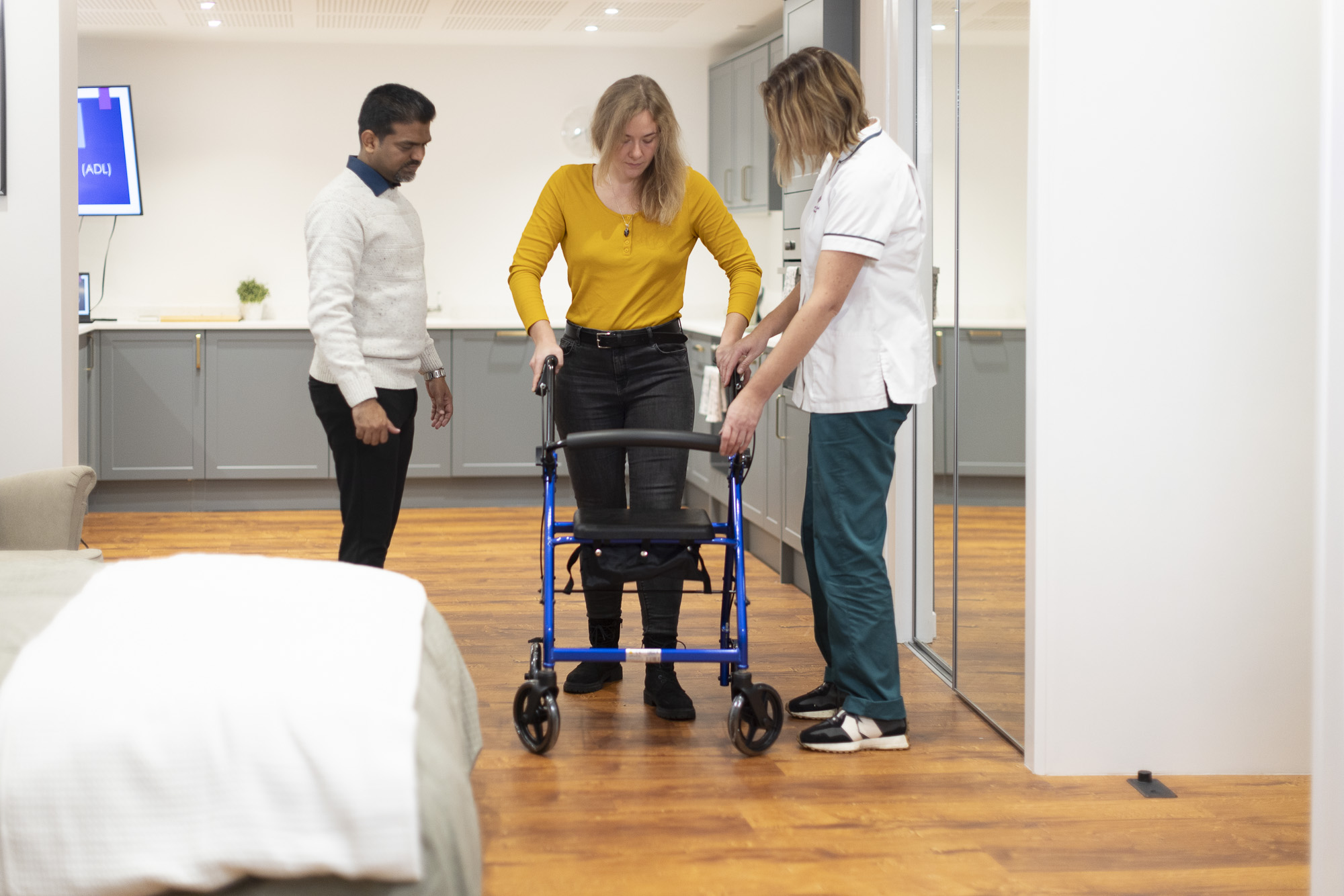
Why become an Occupational Therapist?
Occupational Therapy offers a really varied career, with opportunities to work within a range of different settings and with a range of people.
Working as an Occupational Therapist gives you the chance to make a big positive difference to people lives. You’ll be helping people to navigate and overcome challenges that they are facing at a difficult point in their lives. You’ll be helping people to stay as independent as possible, enabling them to keep doing the things that they love.
As such, good communication and people skills are really important to an Occupational Therapist.
You can read more about the important reasons why people choose to become Occupational Therapists here on the Royal College of Occupational Therapists website.

How Do I become an Occupational Therapist?
To become an occupational therapist, you’ll need to study for a degree in Occupational Therapy, either at the undergraduate or postgraduate level. We offer our MSc Occupational Therapy (Pre-Registration) degree here at Health Sciences University.
What might I have studied already?
Many of our applicants have studied Psychology, Health and Social Care, Education, or Sociology degrees. We generally look for a 2:2 in a relevant science degree subject or relevant experience in health and social care.
If you are unsure whether you have the right qualifications for this course, please contact our friendly Admissions team by emailing admissions@aecc.ac.uk.
Find out more about our Occupational Therapy course via the link below:
BSc (Hons) Occupational Therapy (Integrated Degree Apprenticeship)
Course Lead: Parag Sawant 
Course Lead: Parag Sawant
Parag gained his Masters in Occupational Therapy (Neurosciences) from Maharashtra University of Health Sciences, Nashik, India, in 2014. Since then, he has been working in Occupational Therapy clinical practices within various neurorehabilitation settings.
He has worked within multidisciplinary teams and has hands-on experience in upper-extremity robotics in neurorehabilitation for stroke patients. He also runs Cognitive Rehabilitation clinical services at the Integrated Rehabilitation Centre (IAC).
Parag led an Occupational Therapy clinical setting within a Neurosurgery Rehabilitation unit in a municipal tertiary healthcare setup in Mumbai, India.
Our Occupational Therapy facilities 
Our Occupational Therapy facilities
Our Assistance for Daily Living Suite (ADL)…
Podiatry
What is Podiatry?
A Podiatrist aims to reduce pain and improve function in patients. In some cases. Depending on the patient group, Podiatrists have a key role to maintain tissue viability and prevent amputation.
It’s a broad scope of practice and the profession offers a huge amount of flexibility. There are a range of specialisms within Podiatry, including: musculoskeletal complaints, foot surgery, rehabilitation, wound management (typically in diabetic patients); and even forensics and sports medicine. Premiership football teams all have Podiatrists, for example.
What is a Podiatrist?
Podiatrists diagnose, treat and rehabilitate diseases and complications, help with pain, treat infection and support people with foot complications associated with long-term conditions, such as diabetes, arthritis and poor circulation.
Podiatrists regularly work in teams with other healthcare professionals. They coordinate care across a range of settings, including GP surgeries, patients’ homes, and hospitals to make sure patients get the best care wherever they are.
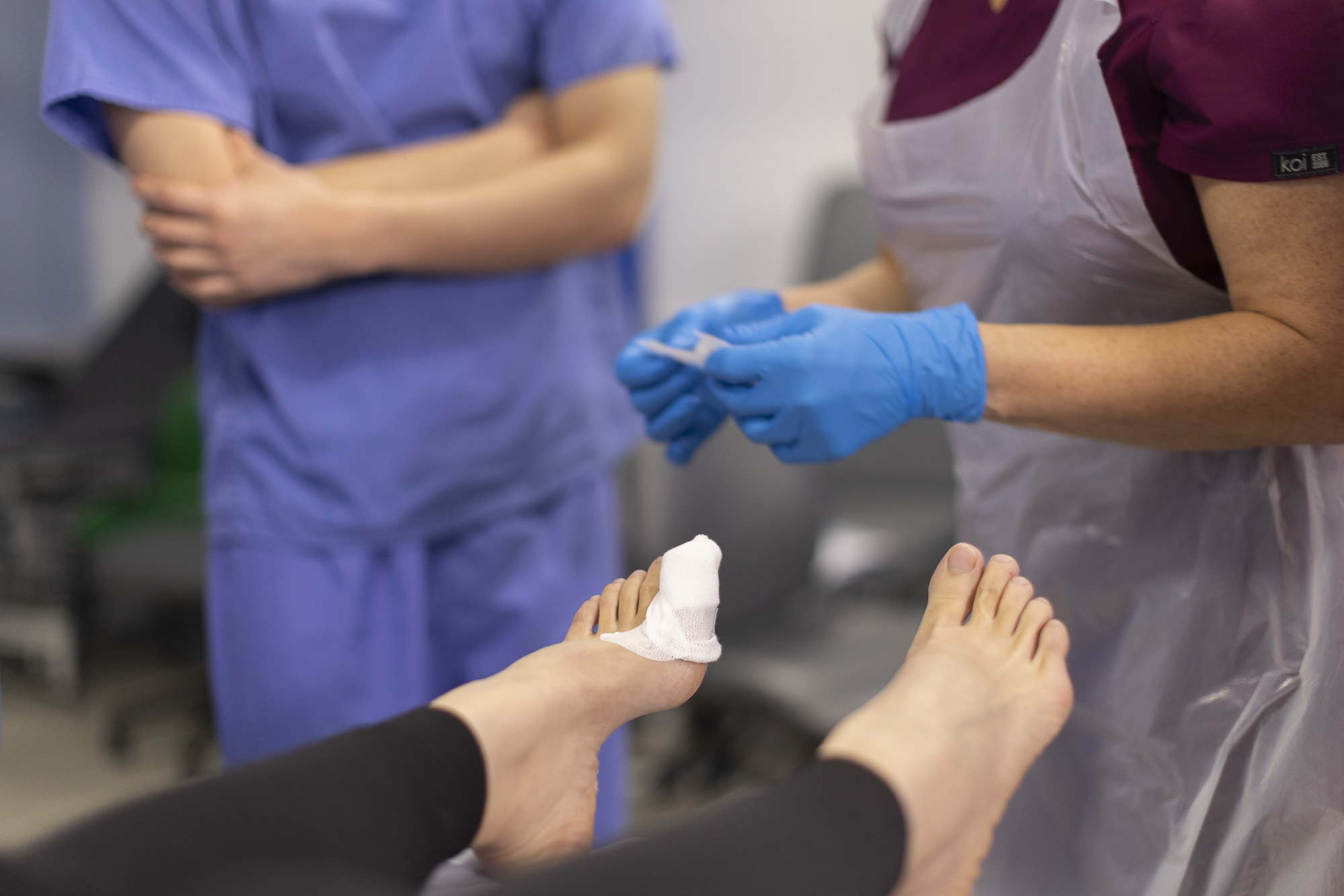
Why become a Podiatrist?
Podiatry offers an exciting and varied career option, with plenty of opportunities to specialise, develop and grow your skillset.
Podiatrists have a huge impact on their patients, improving mobility, relieving pain, and helping with overall foot health. Choosing Podiatry as a career path could see you make a big difference to people’s lives.
Podiatry combines a specialist focus with high demand. There is currently a national shortage of Podiatrists in both NHS and private practice. As our population ages and lives with more long-term health conditions, there is a growing need for more professionals in this area. This means employment prospects are very strong for Podiatrists.
As a Podiatrist, you have the option of working either in the NHS and privately – or you can decide to pursue both of these routes. You could be working in private practices, hospitals, clinics, sports medicine facilities, and more.
You’ll earn a competitive salary, especially as you grow in experience, and you’ll find that you are always learning. Podiatry offers extensive opportunities for professional development.
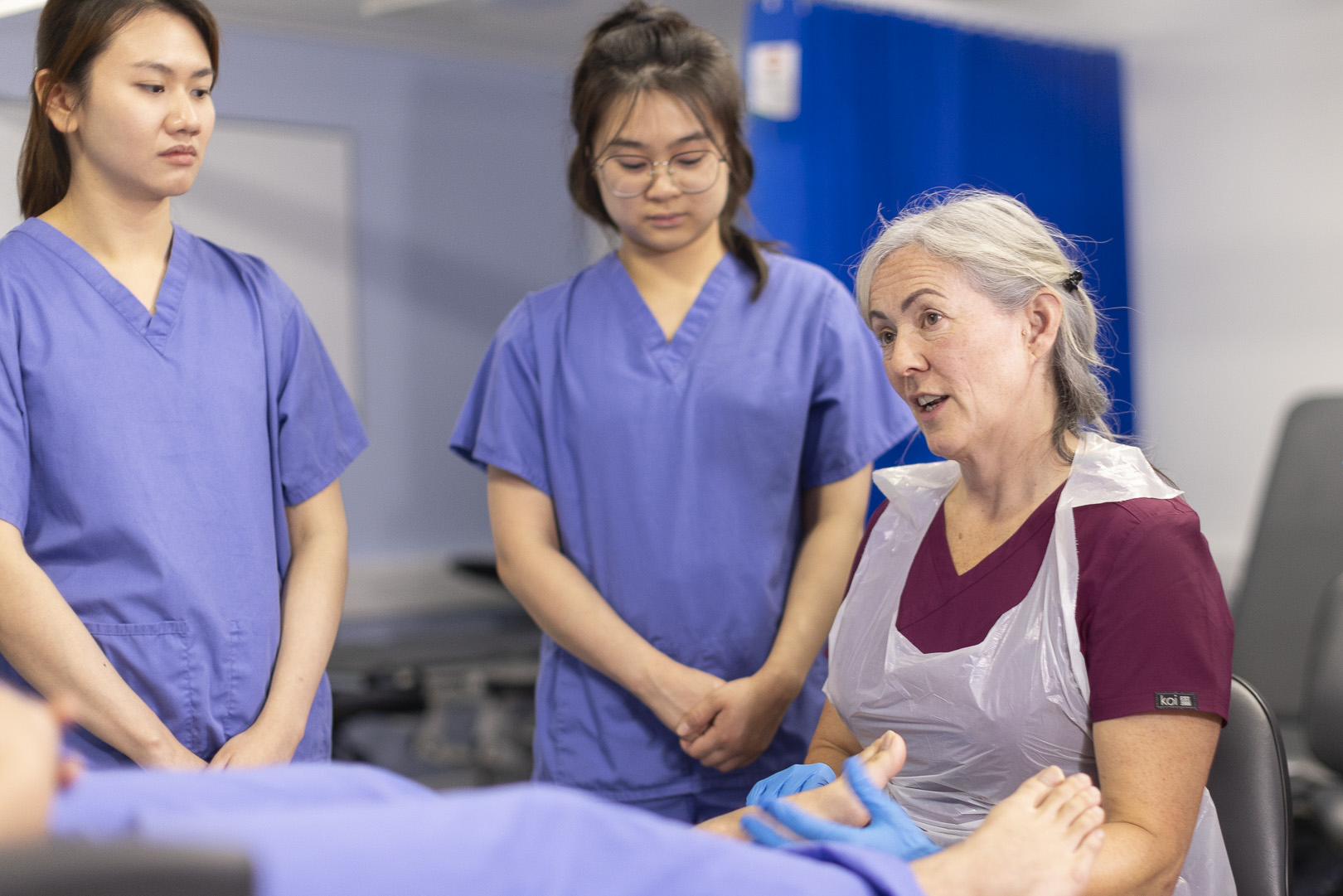
How do I become a Podiatrist?
Podiatry offers an exciting and varied career option, with plenty of opportunities to specialise, develop and grow your skillset.
Podiatrists have a huge impact on their patients, improving mobility, relieving pain, and helping with overall foot health. Choosing Podiatry as a career path could see you make a big difference to people’s lives.
Podiatry combines a specialist focus with high demand. There is currently a national shortage of Podiatrists in both NHS and private practice. As our population ages and lives with more long-term health conditions, there is a growing need for more professionals in this area. This means employment prospects are very strong for Podiatrists.
As a Podiatrist, you have the option of working either in the NHS and privately – or you can decide to pursue both of these routes. You could be working in private practices, hospitals, clinics, sports medicine facilities, and more.
You’ll earn a competitive salary, especially as you grow in experience, and you’ll find that you are always learning. Podiatry offers extensive opportunities for professional development.
Find out more about our Podiatry courses via the links below:
MSc Podiatry (Pre-registration)
BSc (Hons) Podiatry (Integrated Degree Apprenticeship)
Additional course information
Is My Previous Degree Relevant? 
Is my previous degree relevant?
Our applicants tend to have studied Higher Education courses in Natural Sciences, Psychology, and Sport Sciences. These courses make a perfect entry point to Podiatry and this course is a great fit for these graduates to complement their skills and knowledge. Equally, we are happy to consider those with a prior degree in a range of subjects.
If you’re unsure whether you have the right previous experience, please do get in touch with our friendly Admissions team by emailing admissions@aecc.ac.uk.
Course Leader: Simon Otter, Associate Professor in Podiatry 
Course Leader: Simon Otter, Associate Professor in Podiatry
Simon is an Associate Professor in Podiatry with over 20 years in the profession. He worked as a Podiatrist in the NHS for nine years, specialising in high-risk foot care, nail surgery and musculoskeletal medicine, before taking up an academic teaching post in Podiatry at the University of Brighton.
Simon was part of the team that provided Podiatry care for the London 2012 Olympic/Paralympic Games and each year volunteers as part of the medical team at the London Marathon. He has been the Podiatry Advisor to Arthritis Care, and the England men’s senior blind football team.
Simon went on to lead the Podiatry department, before moving to New Zealand to undertake a post-doctoral research fellowship.
Prior to moving to HSU, Simon co-designed and validated the first accelerated, pre-registration MSc Podiatry in the UK and helped validate the first ever Apprenticeship for Podiatrists in the UK.
Our Podiatry Facilities 
Our Podiatry facilities
Our facilities include a fully fitted state-of-the-art Podiatry Clinic that functions as both a learning space for our students and a real-world clinic for patients at our Integrated Rehabilitation Centre.
As part of the wider multidisciplinary clinical team at the HSU, our Podiatry Clinic benefits greatly from the expertise and collaboration of other healthcare specialists, rehabilitators, and state-of-the-art facilities onsite.
Additional Funding
Students studying for a recognised Allied Health Profession qualification may be entitled to apply for additional funding from the NHS Learning Support Fund.
This fund provides supplementary financial support to the mainstream student loans system, and is intended to support students whilst they train and gain professional registration. This funding is not means-tested and is a grant rather than a loan, so the majority of students will not need to pay it back when they start work in the future.
If you’re eligible, you will be entitled to:
- A training grant of £5,000 per academic year
- Parental support of £2,000, if you have at least one dependent child under 15 years, or under 17 years if registered with special educational needs
- Money back for excess travel and temporary accommodation costs (Travel and Dual Accommodation Expenses) while you’re on your practice placement
- Students experiencing financial hardship (Exceptional Support Fund).

Looking for more subjects?
We offer health education undergraduate and postgraduate degrees and professional short courses in the fields of chiropractic, medical imaging and radiology, psychology and sport, exercise and health science. Visit the subject areas that interests you and register your interest on a course.
News
Discover and read all the latest news, press releases and happenings here at Health Sciences University.
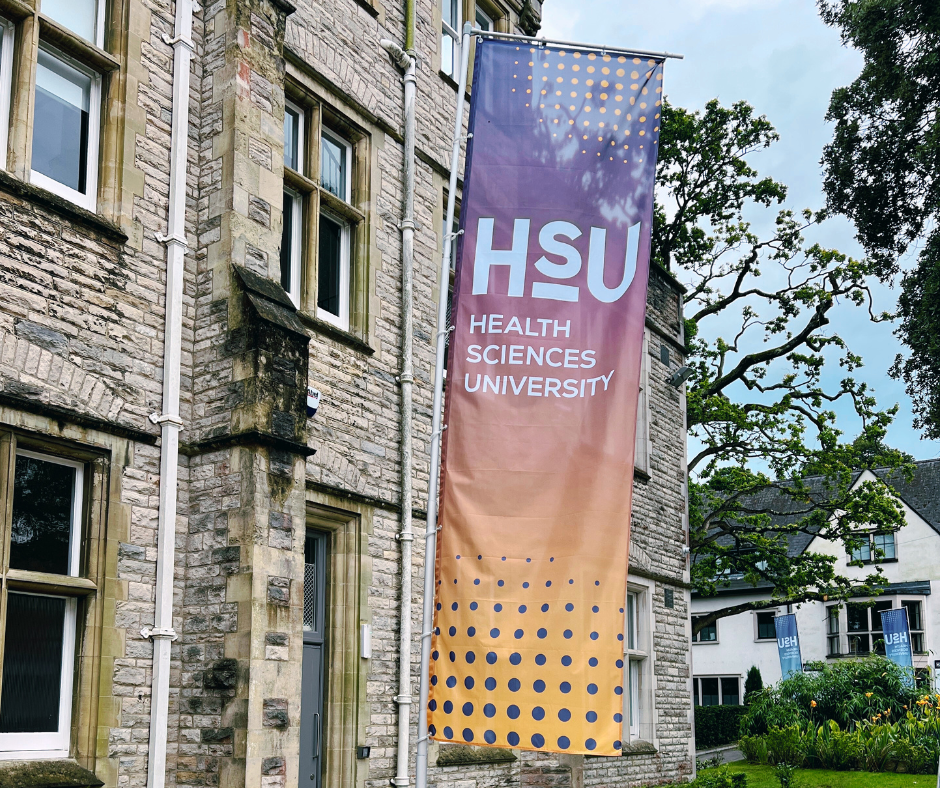
Health Sciences University (HSU) and the College of Integrated Chinese Medicine (CICM) have confirmed that they have begun early exploratory discussions about the possibility of a future merger. HSU and CICM already have an established academic relationship, with HSU currently validating CICM’s degree provision. The discussions now underway are separate from, and additional to, this existing validation arrangement.

Nils Theuninck is a third-year Master of Chiropractic student at Health Sciences University with an impressive background in elite sailing. He has competed internationally as part of the Swiss National Sailing Team and has earned several podium finishes at major events. Most recently, Nils sailed with Alinghi Red Bull Racing in their challenge for the 37th America’s Cup. His dedication to both sport and chiropractic has been recognised with a 2025 International Sports Chiropractic Federation (FICS) Student Scholarship. We spoke to him about his sailing journey, how this influenced his decision to study chiropractic, and his goals for the future.
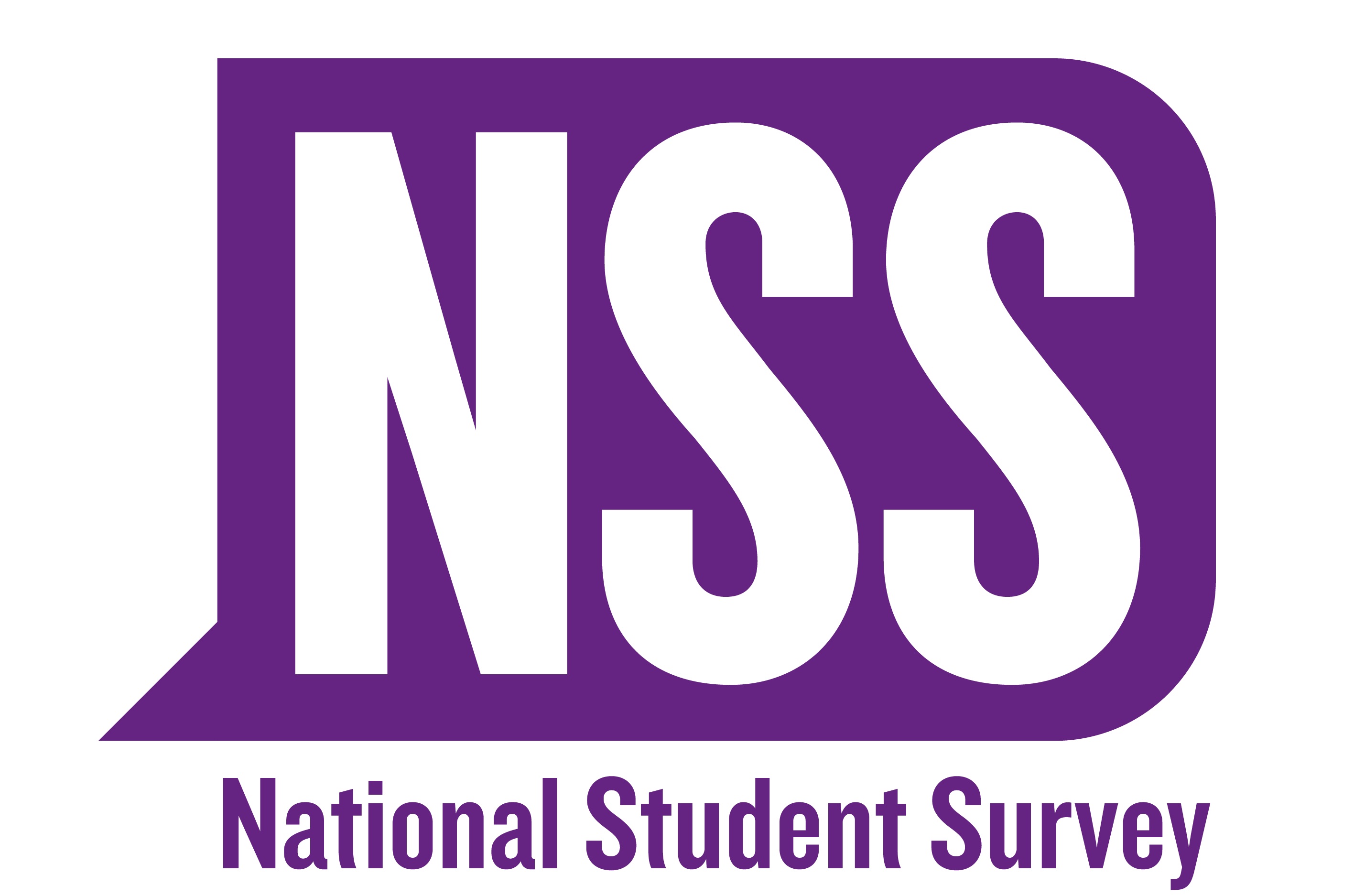
The National Student Survey (NSS) is now open and will close on 30 April 2026. If you’re a final‑year undergraduate, this is your chance to tell us about your experience of studying at HSU.

Our campuses in Bournemouth and London will be closed from 6pm Wednesday 24th December 2025, and will re-open at on Monday 5th January 2026.
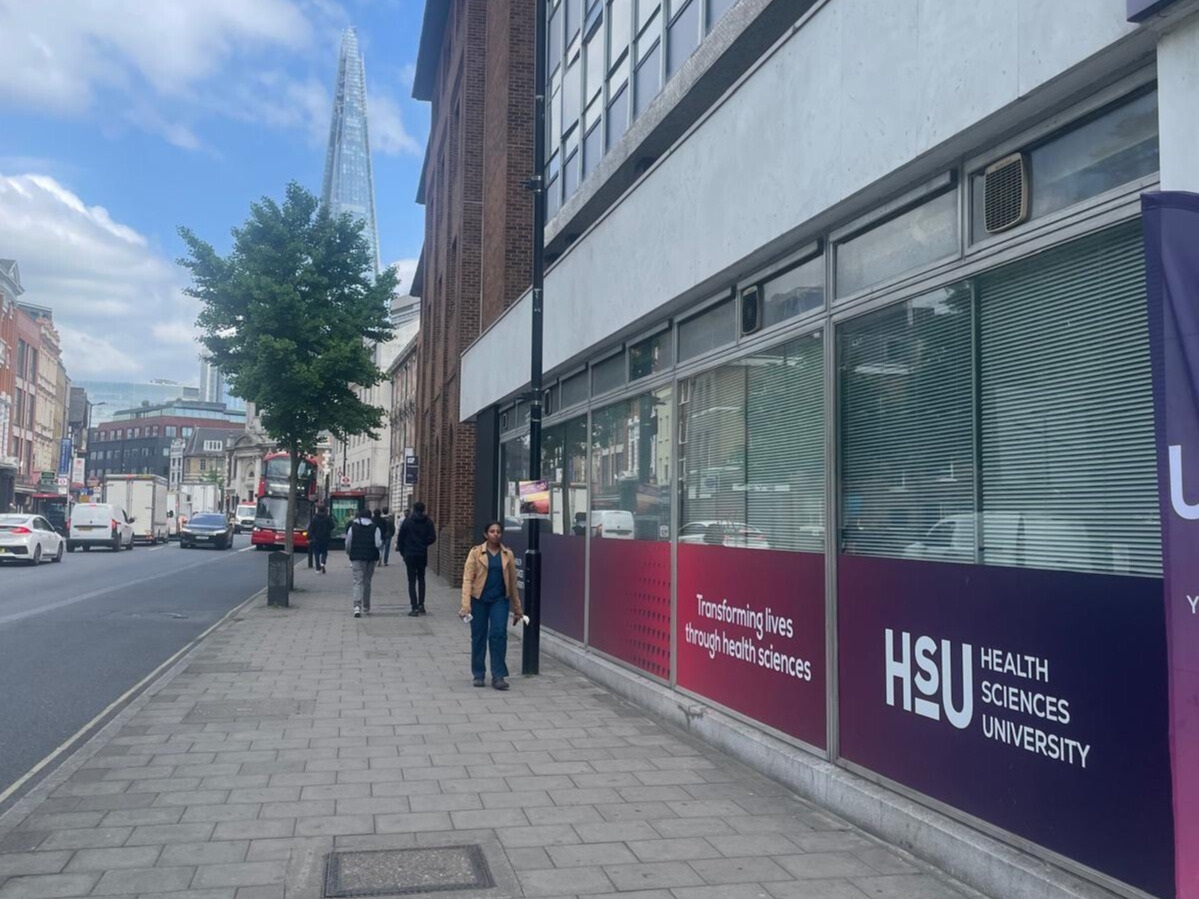
An innovation developed through HSU’s Centre for Osteopathic Research and Leadership (CORaL) has been selected by the World Health Organization as one of just 21 projects worldwide to feature at the WHO Global Summit.

Advance HE has published a new report that explores the merger which brought together AECC University College in Bournemouth and the University College of Osteopathy in London to create Health Sciences University (HSU).
